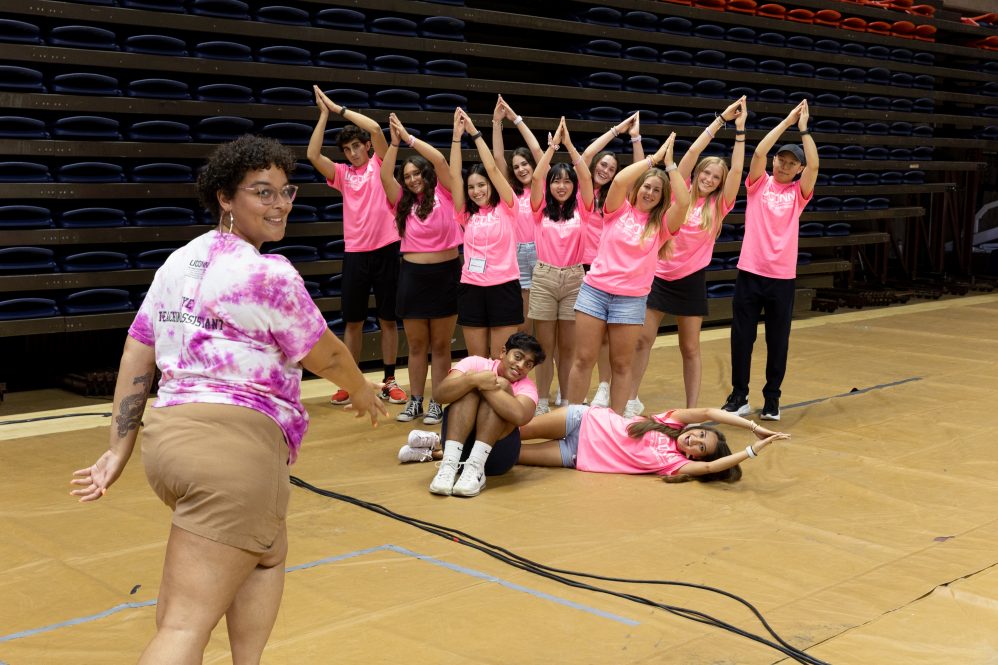Giselle Malloy ‘23 (CAHNR) is a proud “super senior.” Now in her fifth year at UConn, she’s rounding out a robust undergraduate career as a teaching assistant, residential assistant, and hardworking researcher.
On her LinkedIn profile, she proudly proclaims herself as a “future hydrologist,” and it doesn’t take long to pick up on her infectious enthusiasm for water stewardship.
“Hopefully I can go into restoring clean water,” she says, specifying the Chicago River as one site where her work in hydrology could have a positive impact. “That’s been a very polluted area that a lot of people can’t drink, especially in the urban areas. That’s environmental injustice.”
Research and Outreach on the Yakima River

Malloy, a natural resources major, recently returned to Storrs after a summer spent at Washington State University through the National Science Foundation’s Research Experiences for Undergraduates (REU) program. Like many parts of the country, Washington has staggered under the effects of climate change in recent years. Wildfire smoke consistently chokes the region in the summers, while climbing temperatures and diminishing rainfall amplify drought conditions.
The Yakima River, one of the state’s major sources of drinking water and irrigation, is feeling the pain. Malloy’s cohort searched for solutions to preserve this vital natural resource and ecosystem as climate change intensifies.
They set their sights on the central Washington city of Ellensburg. The city is situated on the Yakima, which runs for 214 miles between the south central and eastern part of the state. Malloy’s team began investigating the role of floodplain restoration in promoting aquifer restoration within the city and surrounding areas.
“It’s an urban area, and they get the most frequent floods, and it can cause drastic changes to their environment,” Malloy says. “So when we noticed the Yakima was right by the city, we were like, hey, can we put this floodplain in this specific area?”
Malloy previously conducted field and lab work, but this was her first experience with direct outreach to stakeholders. This outreach was critical for her cohort’s goal of cooperatively ensuring a community’s climate resilience: it was just as important as the field work itself, she says. She spoke with engineers and policymakers, outlining the positive effects that floodplain restoration could offer the city.
“When the aquifers recharge, that’s basically groundwater recharge. It’s the same thing that helps prevent impacts from groundwater pumping, such as dry wells, sinking lands. And it also provides wetland habitats, reduces flood risk, and stores water for droughts,” Malloy says.
The project required her to pick up a couple of programming languages along the way: STELLA (Systems Thinking, Experimental Learning Laboratory with Animation) and R. She used these languages to develop dynamic models for the potential outcomes of floodplain restoration to back up her arguments.
A Future in Providing Clean Water to All
The REU experience is the latest in a burgeoning research career for Malloy, who has been “hooked on science” since high school. She attended a STEM-focused school in New London, where a teacher suggested she research the effects of climate change on salt marshes.
“I’ve always been interested in water, but I had more of a broad aspect,” she says. “Now, coming to college, meeting water professors, especially at the College of Agriculture, they’ve helped me really dive into the nitty-gritty of things. So I’m interested in water quality, and now I’m actually interested in droughts and floods and seeing how we can use them as our benefits.”
In her life and her work, Malloy accepts the uncontrollable, such as natural disasters, with determined optimism. As climate change progresses, work like hers will be crucial to ensuring access to clean, safe drinking water across the country, particularly for communities that have long been shortchanged by infrastructure and policy.
Malloy eventually wants to apply her skills in management, her major in natural resources, and her minor in global environmental change to urban water management. She wants other undergraduate researchers—or aspiring undergraduate researchers—to know that there is a place for them in science, no matter the factors outside their control.
“I don’t have the greatest GPA. I was very surprised that I got accepted into REU, especially because of how competitive they are,” she says. “But for those that are kind of on a similar boat like me—please don’t give up. That is one of my things I always try and tell everyone. Just because your GPA isn’t the greatest, as long as you’re trying and you’re showing dedication, people will see you, people will hear you.”
October is the Month of Discovery, when undergraduates are introduced to the wealth of research and innovation opportunities at UConn. This month, enjoy profiles of outstanding undergraduate researchers on UConn Today, attend a full slate of programming on campus and online, and register for Discovery Quest to launch your undergraduate experience to new heights.
Fall Frontiers and the Experience Innovation Expo
Students interested in learning more about research and innovation opportunities at UConn can check out the series of events offered as part of the Month of Discovery. Come to the Fall Frontiers Undergraduate Research Exhibition on Wednesday, Oct. 19, to get inspired by the research and creative projects pursued by students from across the University. The Experience Innovation Expo on Monday, Oct. 24, offers a chance to discover the wide range of programs, resources, and activities facilitating entrepreneurship, innovation, and creativity.



